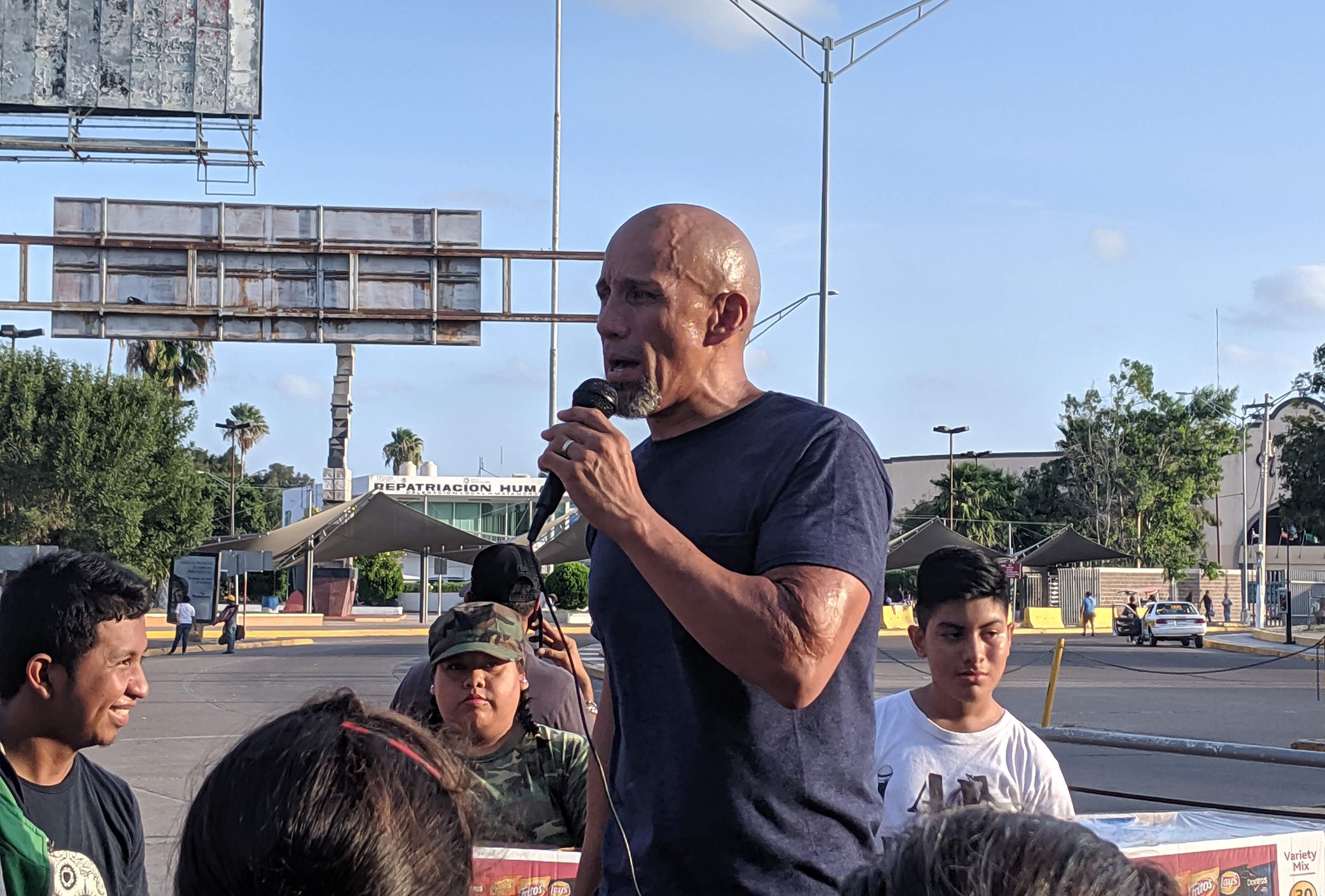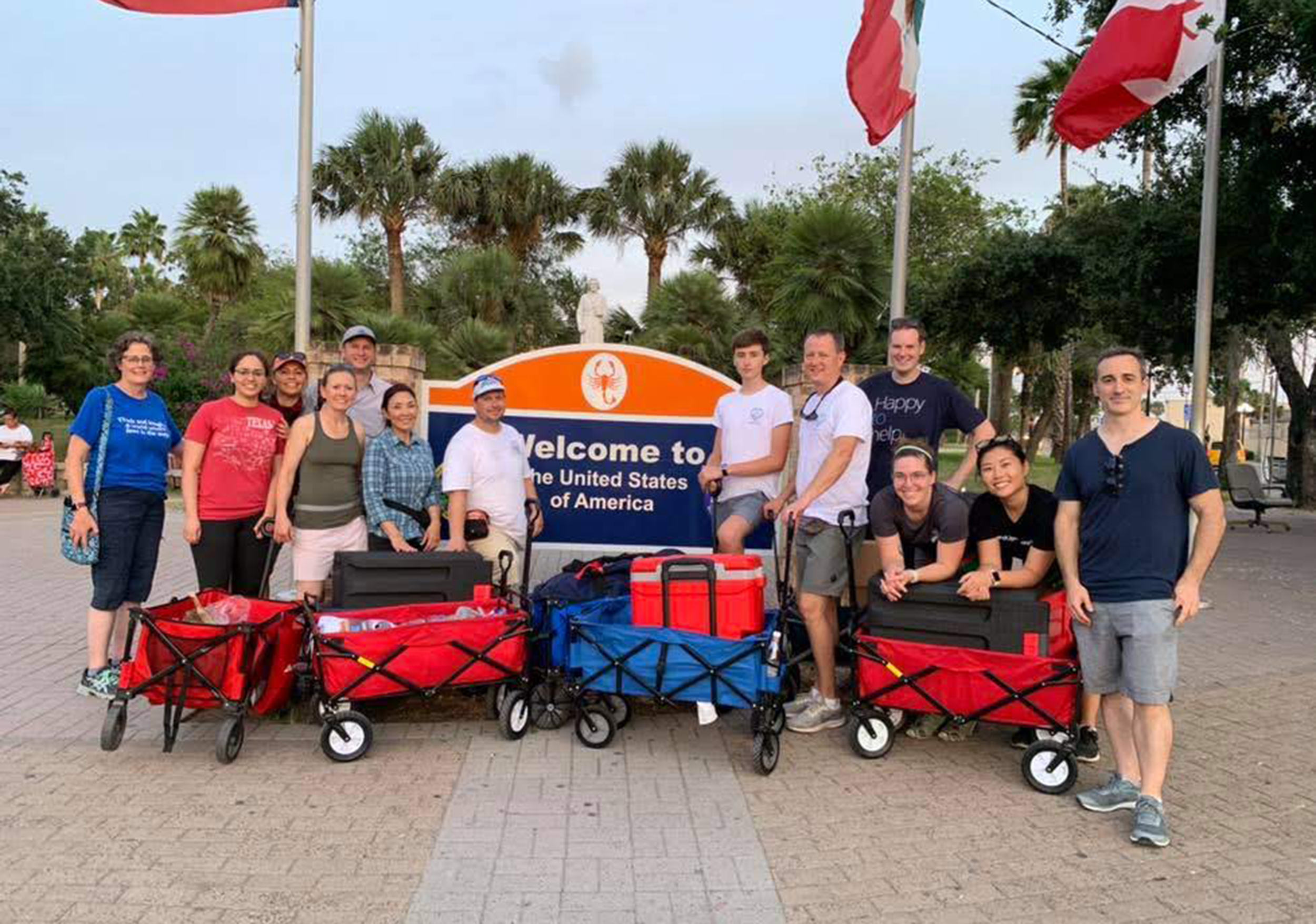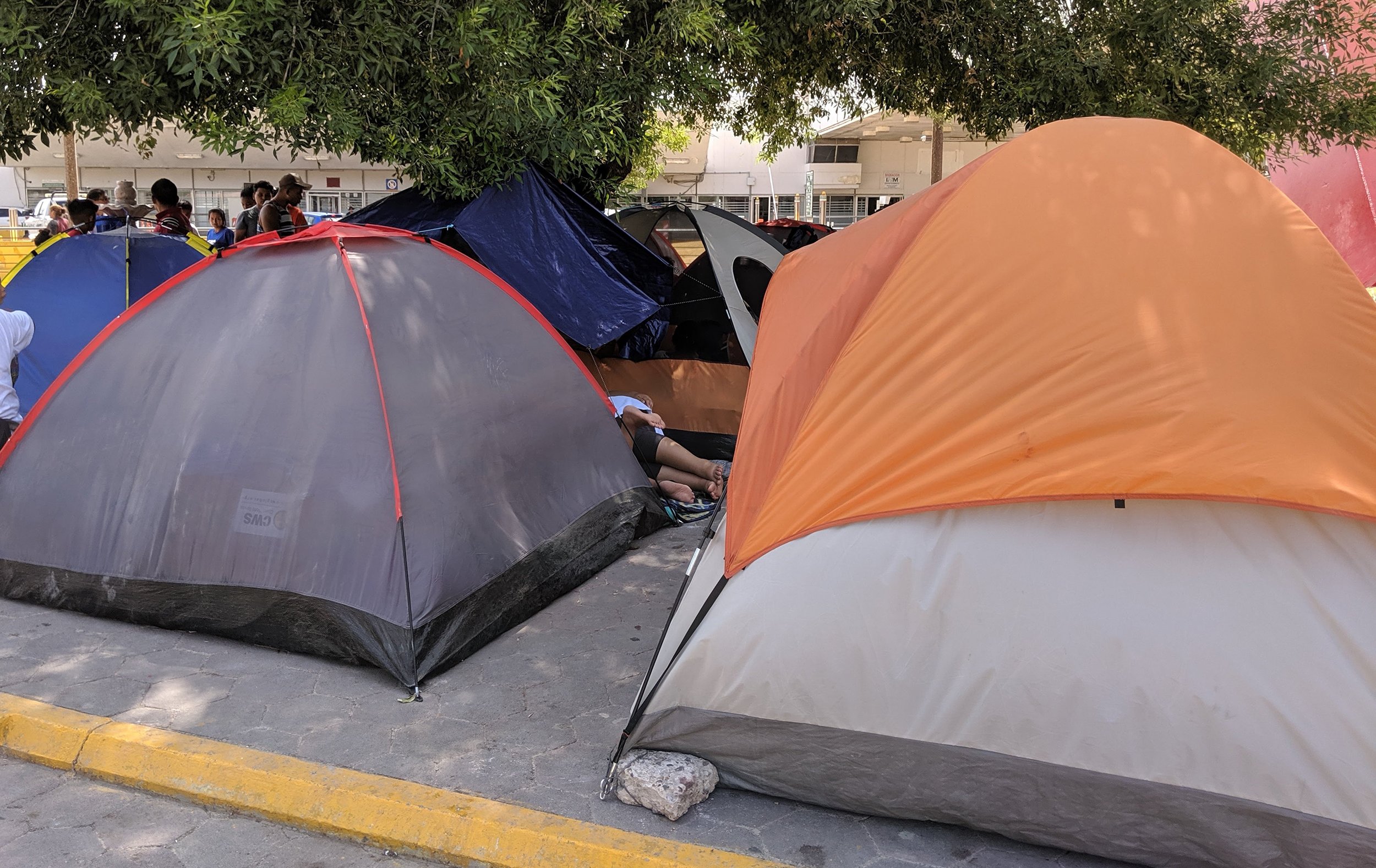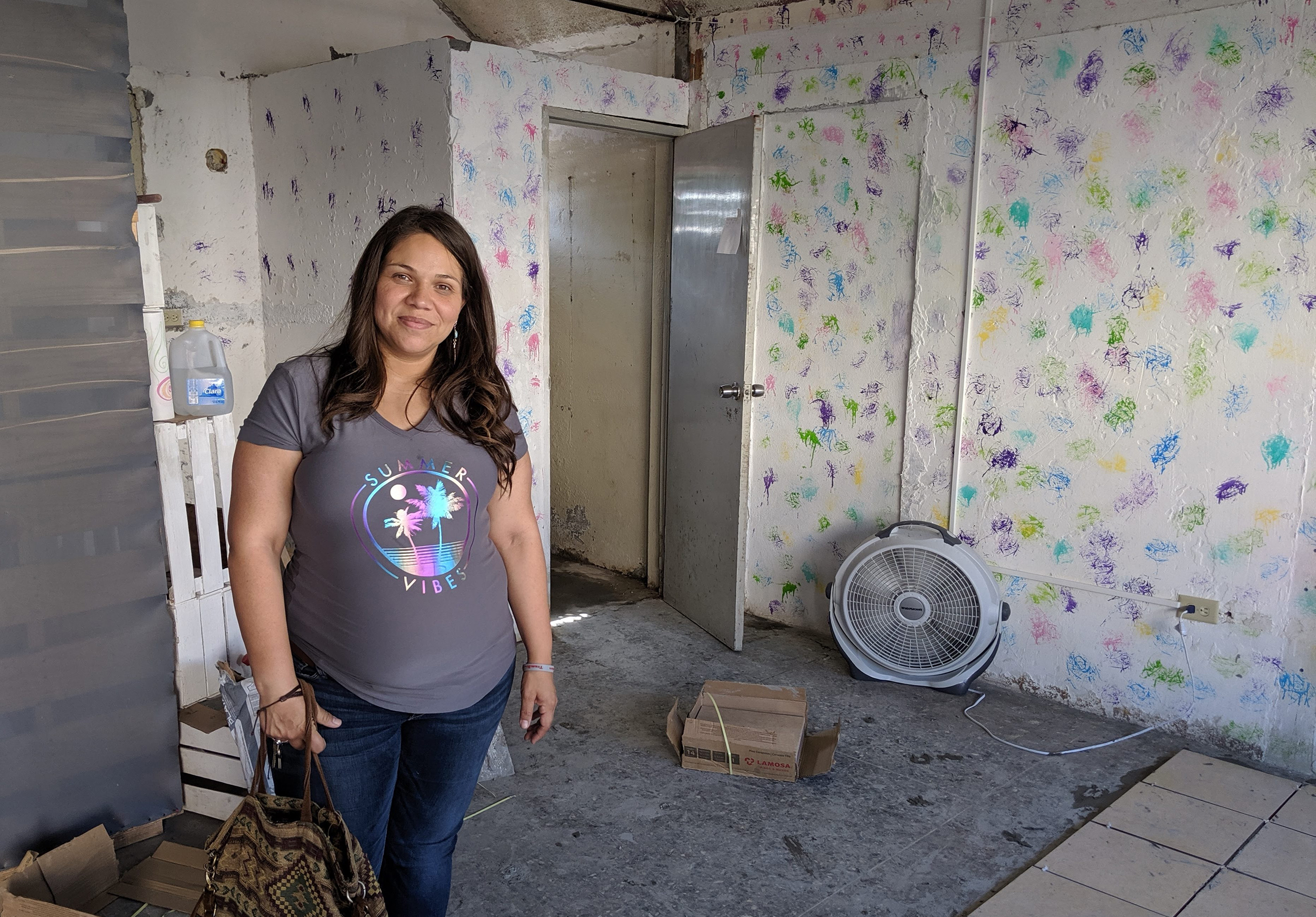On a mid-August evening in Matamoros, Pastor Abraham Barberi can’t wipe the sweat from his forehead fast enough. As the Tamaulipan sun beats down, Barberi arranges styrofoam cups of red Kool-Aid on a fold-out table, then begins handing out ham and cheese tortas from a plastic trash bag to hundreds of hungry travelers from all over Latin America. He’s brought nearly 250 sandwiches, but with about 20 migrants left in line, Barberi has to throw up his hands and apologize. He’s fresh out.
Since November, Barberi and volunteers from his nondenominational church in Matamoros have been helping migrants stranded by one of two Trump policies currently in place: “metering,” the year-old policy of making asylum-seekers wait months in border towns to request protection properly at the bridges, or the Migrant Protection Protocols (MPP), which forces asylum-seekers to return to Mexico to await U.S. court dates months in the future.

MPP first launched in January in California and expanded to Matamoros just last month. Since then, the number of migrants camped out just yards from the Gateway International Bridge has skyrocketed. In early July, I watched a different church group serve about 75 migrants; now the numbers are approaching 300, a jump that’s straining charitable groups on both sides of the border.
“The Bible says we should help the needy and the foreigner; it’s the right thing to do,” said Barberi. “Hopefully it’s not going to be like this forever.”
Under MPP, asylum-seekers who’ve already waited up to three months in Matamoros to apply for protection are being returned with court dates set for late September or October. Some who waited in other cities, including a group of Cubans I met who’d been in Ciudad Miguel Alemán, are being returned to Matamoros too, on top of migrants who crossed the river illegally in Matamoros or elsewhere. Many have no money, so they take to sleeping on the ground by the bridge. Many feel trapped, too afraid of kidnapping and extortion to venture into the city, and Matamoros has no shelter with capacity to take them in. In theory, they should be preparing for their court hearings; in practice, they’re stuck at the bottom of Maslow’s pyramid. That’s where a binational crew of good Samaritans is doing what they can to help.

Since last summer, Team Brownsville has been bringing meals to asylum-seekers in Matamoros. At first, the nonprofit only had to muster enough food for a couple dozen folks. But lately, “It’s an overwhelming task right now to get everybody fed,” said Sergio Cordova, one of the group’s co-founders. The team prepares and transports dinner five nights a week, Cordova said, and pays a Matamoros restaurant to provide breakfasts. The group also brings toiletries and clothing, including shoelaces and belts to replace those taken by Customs and Border Protection (CBP) during processing. Recently, Team Brownsville launched a Sunday morning school for migrant kids who are going months without formal education. The team, he said, runs on individual donations: “As long as the donations keep coming in, we’ll keep it up.”
Jodi Goodwin, a Harlingen-based immigration attorney, is the only lawyer who regularly visits the migrants in Matamoros. Once a week, she crosses over to provide basic information about asylum and screen as many migrants as she can to let them know how strong or weak their case seems. Unlike in criminal proceedings, the immigration courts don’t provide free legal defense, so it’s up to the migrants to find lawyers they can afford. Asylum cases are time-consuming, as attorneys must gather evidence and reconstruct their clients’ life stories. Many lawyers, Goodwin said, won’t cross into Mexican border towns to meet with potential clients, especially for little to no money and for challenging cases.
“It’s ridiculous to not even have consistent access to your client; it’s very difficult,” she said. On top of more attorneys, she said she sorely needs volunteer English/Spanish translators who could help in-person or by translating documents remotely.

As in Nuevo Laredo, MPP is successfully convincing many migrants stranded in Matamoros to abandon their dream of reaching the United States. Multiple parents with kids from Central America’s Northern Triangle told me they were thinking of going home. Some said they’d never actually wanted asylum at all, but just to live and work in the United States for a time. Last week, Mexican officials began offering bus rides to Chiapas, a southern state that borders Guatemala, and many accepted the ride in order to then go back home, multiple migrants told the Observer. The rides are voluntary and no migrant reported feeling coerced to leave, unlike in Nuevo Laredo, where migrants have reported being ordered to leave their camp and being pressured to take bus rides to Monterrey or Chiapas.
In a new legal twist, the vast majority of migrants in Matamoros and other cities abutting the Texas border may find themselves ultimately ineligible for asylum. Last month, the Trump administration unleashed a policy banning asylum for migrants who did not seek asylum in at least one of the countries they passed through on their way to the United States. A federal judge in California halted the measure nationwide, but on Friday, the 9th Circuit curtailed the injunction, allowing it to take effect in New Mexico and Texas. Migrants are still eligible for other, more difficult to obtain, forms of protection. The ruling could be negated as further legal wrangling ensues.
However the legal landscape shifts, Gaby Zavala wants to get the migrants in Matamoros out of crisis mode, so they can make informed decisions. Zavala, who lives in Brownsville and runs a respite center for migrants there, is fundraising for what she calls a “resource center” in Matamoros. There, lawyers like Goodwin will be able to meet with clients and hold asylum workshops, and Gladys Cañas, a Matamoros activist with Asociación Ayudándoles a Triunfar, hopes to set up a kind of workers center, where she can help the migrants find day jobs and make sure they’re treated fairly. (All the returned migrants in Matamoros who I spoke with last week had received work authorization from Mexican officials, but they reported difficulty finding anyone willing to hire them.)

Cañas has spent months working, unpaid, to provide the migrants with basic amenities and serve as a liaison with local authorities. She arranged last week for two portable toilets to be set up at the migrant encampment—though that’s woefully insufficient, she said, for hundreds of people. She wants to get migrants off the street both for humanitarian reasons and to calm any local anti-immigrant backlash; a recent poll showed many Mexicans are souring on Central American migrants.
For those who choose to stay and fight their cases, Zavala and Cañas are trying to set them up with lawyers and, if possible, find them work and places to live. For those who want to travel elsewhere in Mexico or return to their country of origin, she wants to make sure they have safe arrangements to their final destinations. “Right now they’re out on their own, and they have people just telling them where to go,” Zavala said, referring to the Mexican government’s scattering of migrants around the country without support. “Let’s prepare them and inform them, so they can make some solid choices.”
Zavala already has her place picked out: a tiny former dentist’s office with holes in the ceiling and bright splotches of paint on the walls, just a few minutes’ walk from the migrant camp. She’d wanted to hire a migrant to fix the place up but couldn’t afford to buy the tools, so she hired a local Mexican man with his own equipment. When I visited last week, he was halfway done laying a new tile floor.
Read more from the Observer:
- Texas Workers Are Dying on the Job at Alarming Rates: “Literally, we’re not holding employers liable for the lives of their workers.”
- From Bon Temps to Bonnghazi—The Tale of Texas’ Embattled House Speaker: How Dennis Bonnen became the target of a lawsuit; a potential Texas Rangers investigation; and of the right, left, and middle.
- Molly Ivins on Climate Change Deniers: “One theory of government is that it only reacts to a crisis; trouble comes when we cannot even agree on what a crisis is,” Ivins wrote in a 1995 column about Congress’ lukewarm response to the threat of global warming.


.png?w=600)




